CyberGhost and NordVPN are known for offering impenetrable security, decent performance, and privacy that very few providers can achieve. While CyberGhost is focused on a larger server fleet, NordVPN is equipped with powerful security features that are updated frequently.
Have no doubt – both providers are excellent. People who think about getting one or another are looking for an in-depth CyberGhost vs NordVPN comparison that will tell them which provider is better, why, and in which instances.
And today, my task is to bring you exactly that. This will be a long NordVPN vs CyberGhost comparison for 2025 but rest assured, you’ll know which one to get by the end of the article. I’ll compare their speeds, security, privacy, applications, support, and so much more.
You have to do your part, though – and that is to keep reading and stay with me. I promise it’ll be worth it!
12000 servers
100 covered countries
45 days money-back guarantee
7 simultaneous connections
9.2 /10
7492 servers
118 covered countries
30 days money-back guarantee
10 simultaneous connections
9.8 /10
CyberGhost vs NordVPN: Apps & Ease of Use
As always (see our CyberGhost vs ExpressVPN comparison), we start off this CyberGhost vs NordVPN duel by comparing their applications and ease of use. No doubt, both providers support a boatload of devices and platforms. To be precise, we’re talking about every platform and system, which includes mobile and desktop systems, too.
In addition, both providers support Android TV, Fire TV Stick, gaming consoles, and other non-typical devices. Mind you, CyberGhost and NordVPN will support a huge array of routers and firmware, making them great for protecting your entire household.
In terms of router support, though, I think NordVPN is a bit better and has broader support for more firmware and router models. In terms of simultaneous connections, CyberGhost is a tad better. It offers 7 of them while NordVPN goes a step backward by offering 6 connections on a single account.
CyberGhost
Let me make something clear. Neither of the providers has an extremely intuitive, minimalistic, and simple interface as is the case with ExpressVPN. They offer big-screen apps on desktop platforms, while their mobile apps are simpler and with fewer features.
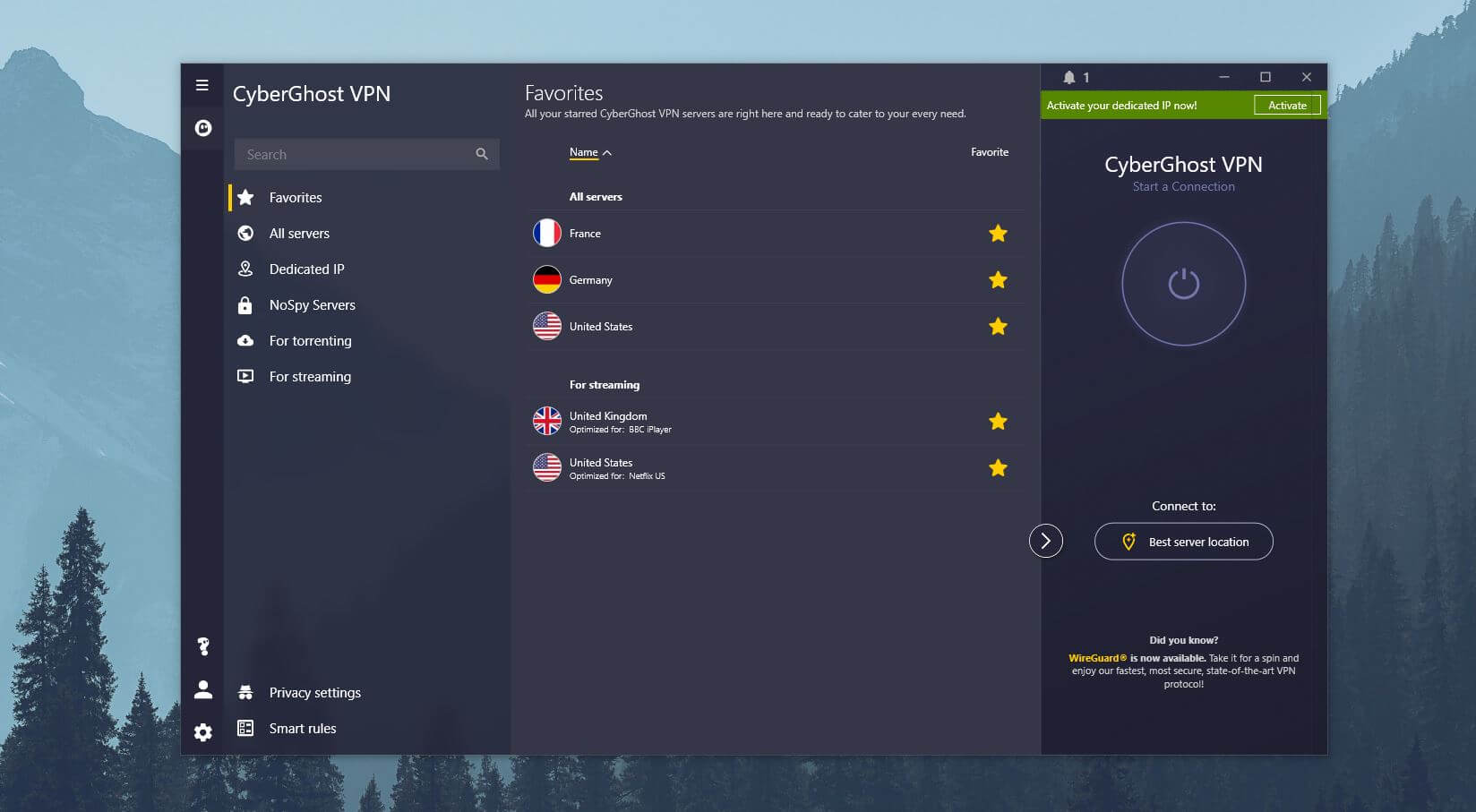
With CyberGhost, getting your way around the app can be simple if you’re just looking to connect to a server. Double-click on the server location connects you to a server, where the entire connection process lasts… well, up to 3 seconds – pretty quick!
CyberGhost lets you choose several types of servers on the left side, with streaming, torrenting, and NoSpy servers being the main categories. In addition, you can see the physical distance next to each server, which I found useful for connecting to the closest one for gaming.
The Settings menu(s) is where the whole CyberGhost experience crumbles. Its features are scattered across three different menus – Privacy settings, Smart rules, and General. In Privacy settings, you’ll find an ad-blocker, kill switch, and DNS leak prevention.
In Smart rules, CyberGhost lets you customize the behavior of the app and enable split tunneling. Finally, in the General menu, you can change your protocol, select MTU size, and disable the IPv6 connection.
To be honest, first-time users will have a hard time getting accustomed to this app on desktop platforms. I’m glad that their mobile app is much simpler, but as far as the desktop app goes, I think it needs a severe overhaul.
NordVPN
NordVPN looks better in my eyes. Its modern look gives out the impression of a high-tech VPN, which NordVPN really is. You have the server list on the left and one click on the server location connects you to a server in the country you want which is pretty clever.
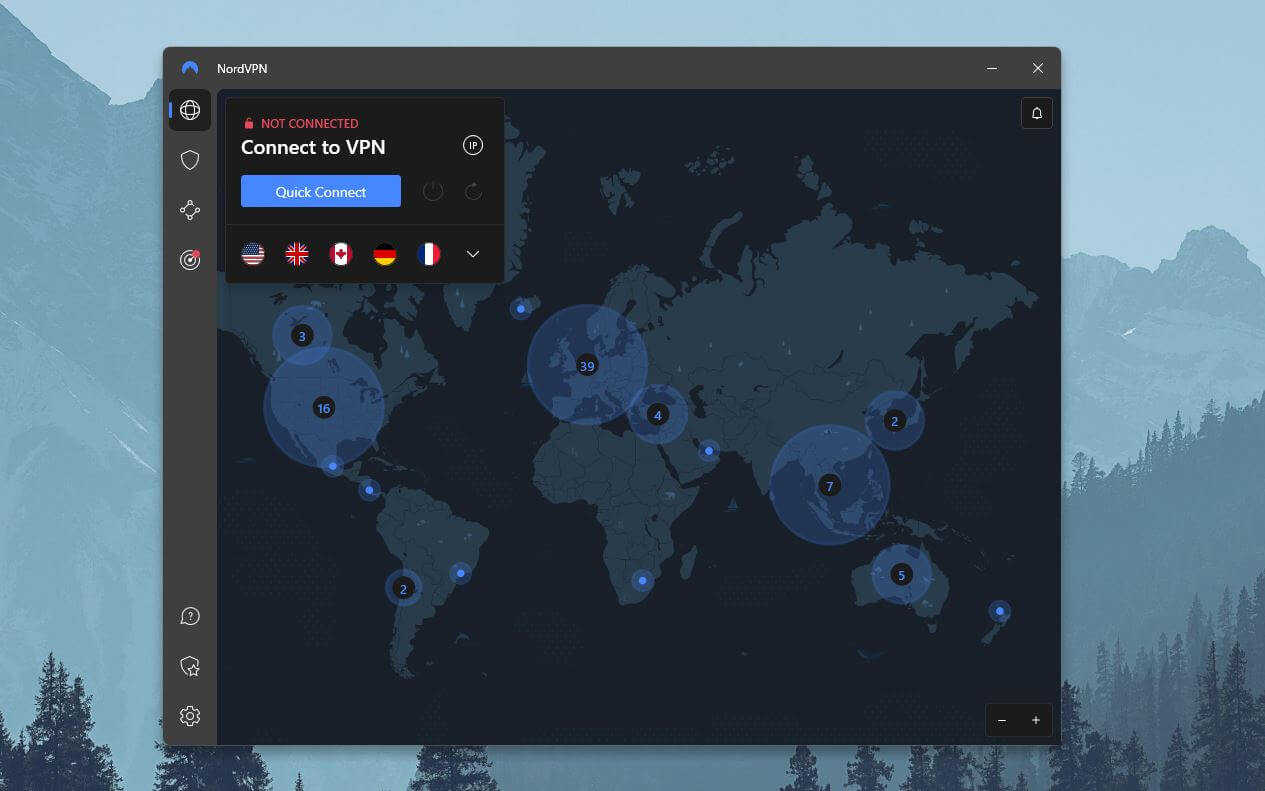
You even have a world map here that you can use to connect to the server of your choice. In the server list, you can also find specialty servers for torrenting, browsing the dark web, or Double VPN servers for doubling your encryption.
Compared to CyberGhost, NordVPN packs a lot more features – for better or for worse. Its Settings menu, much like CyberGhost, is a bit of a mess, although you get separate menus for functions like kill switch and split tunneling, which I appreciate.
We should also mention obfuscated servers that are now easy to enable directly from the server list without manually using OpenVPN TCP. In addition, the protocol options are placed in the Connection menu. Advanced features like Threat Protection and Security Score are on the home screen.
Another function called Meshnet is also here, for example. In simple terms, some features are in the Settings menu, while some of them are on the home screen, which creates a bit of confusion. For instance, another advanced feature called Dark Web Monitor is on the home screen, too. You can find more details about these features in our NordVPN review.
Much like in CyberGhost, I’d like NordVPN to give a bit more attention to its good-looking app. It’s looking good, yeah, but it needs a bit more intuitiveness to be suitable for beginners. Once again, its mobile app is simpler, but to be honest, I prefer CyberGhost’s mobile app over this one. The latter is actually one of my favorite VPN applications on iPhone.
Who Wins?
To digress, CyberGhost WINS this round of the NordVPN vs CyberGhost comparison. It offers more simultaneous connections and a better mobile app, in spite of NordVPN having better router support and modern-looking apps. CyberGhost is, simply put, more functional than NordVPN.
Security & Privacy: Which One Is Safer to Use?
If you ask any experienced VPN user – including me – he/she’ll tell you that security and privacy are the two most important factors of a VPN. Indeed, CyberGhost and NordVPN are all but unsafe providers but they approach this aspect in very different ways.
Of course, quality VPNs like this are similar in some compartments, so I’ll address both their similarities and differences to determine which one is better in this CyberGhost vs NordVPN 2025 duel.
Security Features
Let’s talk about their similarities here. Both providers pack 256-bit AES encryption, a kill switch, split tunneling, and IPv6/DNS leak protection. CyberGhost offers an ad-blocker that also blocks malware, trackers, and pop-ups.
NordVPN gives you the same but it’s called CleanWeb here. Whatever the case, both ad-blockers work really well and I’m sorry that ExpressVPN, their rival, doesn’t have one. In terms of protocols, both providers support OpenVPN.
You’ll hear stories about OpenVPN being a bit obsolete at this point and to an extent, that is indeed true. Its alternatives, WireGuard and NordLynx, are a bit better. You can guess which provider offers which protocols already – CyberGhost has WireGuard while NordVPN has NordLynx.
Moving on, both providers have two very important security features. One is Private DNS. This means both providers use their private DNS servers to handle your DNS requests. These operate according to a no-log policy, so neither of the providers stores this bit of information.
Another feature is RAM-only servers. We find this very beneficial for overall privacy and security. HDD servers are now a thing of the past and RAM servers are a perfect alternative. They lose their data with each restart, ensuring no unwanted logging is going on in the background.
Not only that but they’re also easier to maintain and update while keeping hackers and snoopers away. The RAM-only server can’t be compromised, as the provider can simply restart it, wipe all the data, and leave no information for hacker to steal.
What Are the Differences?
Now that I mentioned it, let’s talk about their differences. NordVPN’s NordLynx implemented WireGuard but gave it a “supercharger” by upgrading its security and fixing the already-existing privacy issues of this protocol.
As such, it made among the safest and fastest protocols on the market. NordVPN includes obfuscated servers as well, and they’re made to bypass censorship in China. CyberGhost has NoSpy servers based in Romania and operated independently by CyberGhost for added privacy.
NordVPN hits back with Double VPN servers for routing your traffic through two servers, which doubles your encryption. In addition, it has other features like Threat Protection and Meshnet, where the first one includes antivirus, malware protection, and the aforementioned ad-blocker.
Meshnet is an interesting one, as it lets you join and host secure LAN parties and remote-control your devices, which is useful for gamers and business management. Mind you these features are “free”, so to say, as you get them with every subscription plan. CyberGhost, on the other hand, has antivirus and security updater.
I found the latter very interesting because it updates your outdated apps and keeps vulnerabilities out of your systems. This feature is, no doubt, unique, but I find it annoying that both of these features will cost you $1 a month on top of your subscription.
Although, if you go for it, you’ll pay roughly the same monthly price as you’d pay for NordVPN – even a bit cheaper! All in all, NordVPN offers a bit more features and specialty servers than CyberGhost, so if you’re looking for that, you know which one to choose.
Is There a No-Logs Policy?
Logging practices of NordVPN and CyberGhost are known to be minimal. Neither of them will store an excessive amount of logs and both of them have what is called a no-logging policy. In addition, both providers are based in privacy-friendly jurisdictions.
CyberGhost resides in Romania while NordVPN found its place in Panama. The first one stores no logs of your connection timestamps, IP address, DNS queries, browsing history, used bandwidth, and other compromising bits of information.
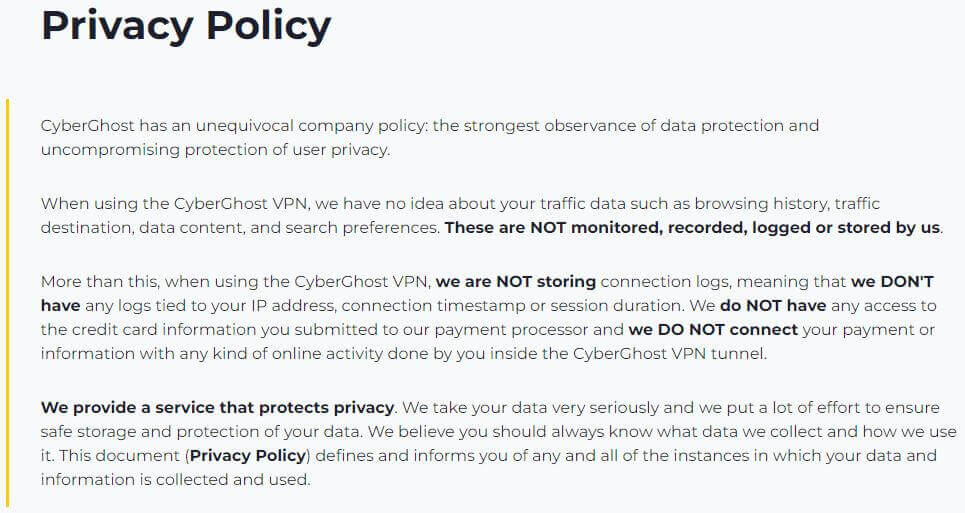
NordVPN follows in the footsteps of not storing used VPN servers, timestamps, websites you visited, download history, or anything similar. The good news is that both providers store only mandatory logs, such as information about your payment method and analytical data for problem-solving.
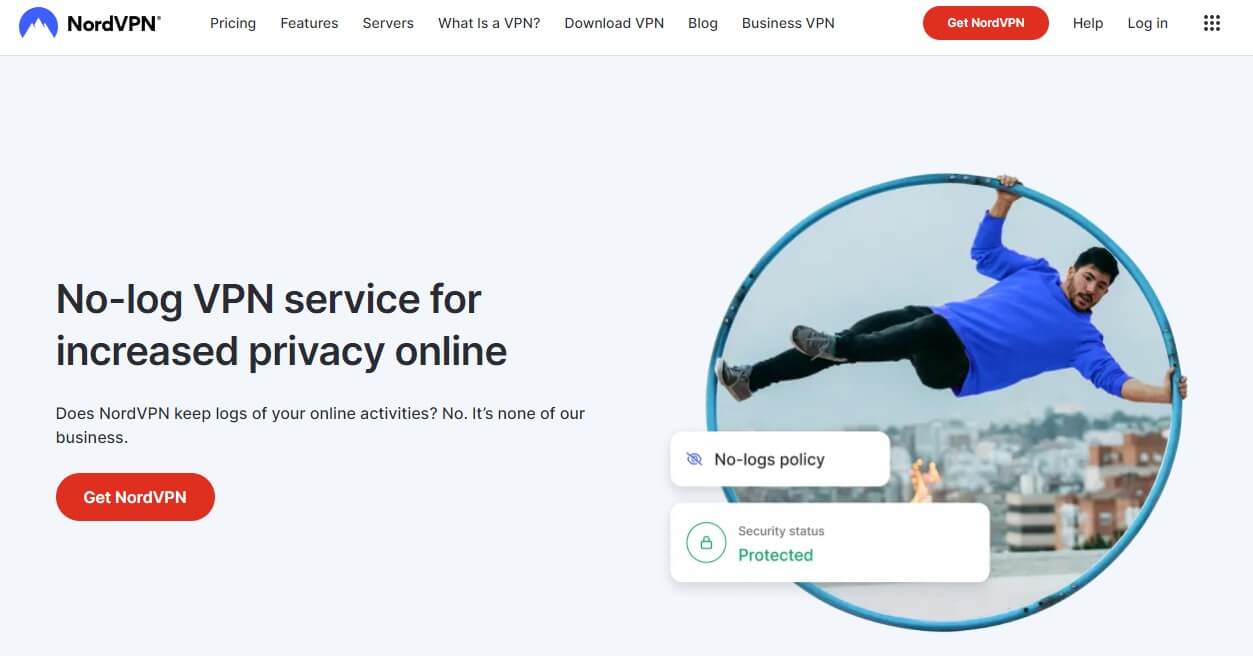
In other words, they don’t know a single thing about your personal info, browsing history, or geo-location. NordVPN, however, has three security audits from PriceWaterhouseCoopers and Deloitte, which is very respectable and speaks volumes about its privacy.
Interestingly, CyberGhost has a security audit as well, and it’s a new one from Deloitte. On top of that, it has transparency reports published every 3 months for added trustworthiness. Remember that NordVPN had a minor security breach in 2018, and although there weren’t any serious consequences, it’s still worth mentioning.
So far, CyberGhost had no such issues and I hope it’ll remain that way now that it’s under Kape Technologies and its ever-growing conglomerate of top-grade providers, including ExpressVPN and PIA.
Who Wins?
This round is a DRAW as both providers display a high level of security and privacy. They both have no-logs policies and advanced security features that make them among the best providers you can get in 2025.
CyberGhost vs NordVPN Streaming Test
If you’re thinking about streaming on geo-restricted platforms, this CyberGhost vs NordVPN comparison will tell you which one is a better choice.
Netflix Test
Let’s start with Netflix. It’s worth mentioning that CyberGhost offers dedicated streaming servers for Netflix in several countries. NordVPN has no streaming servers, which doesn’t mean it’s bad for this purpose – in fact, I’d say it’s a bit better, but hold on to your horses.
For this test, I’ll use the most popular Netflix libraries such as Netflix US, Netflix Canada, and Netflix Japan. I’m located in Europe and I tried to unblock them with both providers. Sadly, CyberGhost worked only with Netflix US, while NordVPN unblocked all of them successfully.
Other Streaming Platforms
But what about other streaming platforms? Well, let’s take a look at some of them.
The first one I tested was BBC iPlayer. It’s a free British streaming platform available only in the United Kingdom. However, with a UK IP address, I managed to unblock it with no issues with both providers.
Another streaming platform I tested was Hotstar. This platform is based in India and requires an Indian IP address to be unblocked. NordVPN has no servers in India as we speak, but CyberGhost has a few virtual servers in this country. Needless to say, CyberGhost works in this case.
When it comes to platforms like Hulu and HBO Max, I’m happy to report that both providers work flawlessly, so you’ll have no issues with any of them on that front.
Who Wins?
In this round, NordVPN WINS given its ability to unblock far more Netflix catalogs than CyberGhost. Although the latter works with Hotstar, it’s not enough to win this round due to below-average Netflix performance. NordVPN is a much better choice if you want to watch US Netflix abroad, for example.
NordVPN vs CyberGhost Speed Comparison: Which One Is Faster?
In this NordVPN vs CyberGhost comparison, I think it’s the right time to compare the speeds and performance of both providers. During both tests, I set the protocol selection to “Automatic” to ensure I get the best possible performance out of the VPNs.
Also, I tested these providers 3 days in a row, 3 times a day, by using 4 server locations. I used the US, the UK, Australia, and Japan, to cover different parts of the globe. Once again, I’m located in Eastern Europe, and my native download/upload speeds and ping look like this:
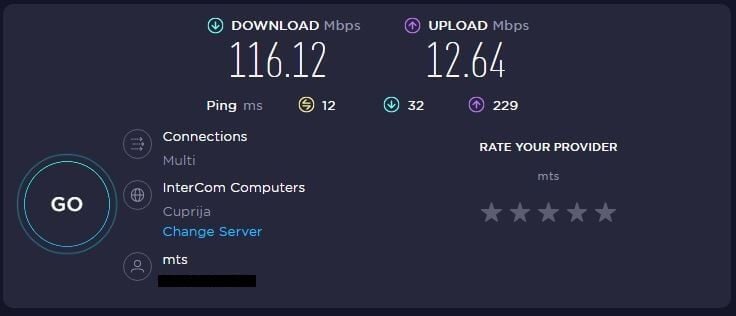
With that in place, let’s check how fast these VPNs are in different server locations.
NordVPN
US:
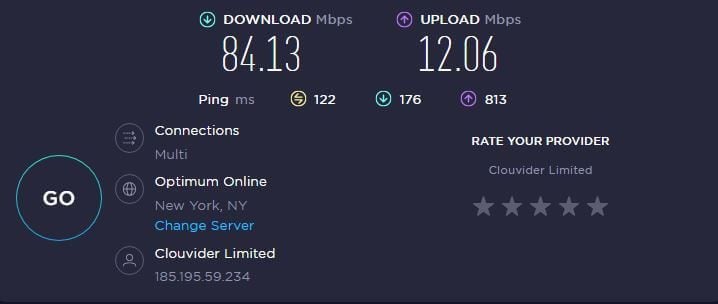
UK:
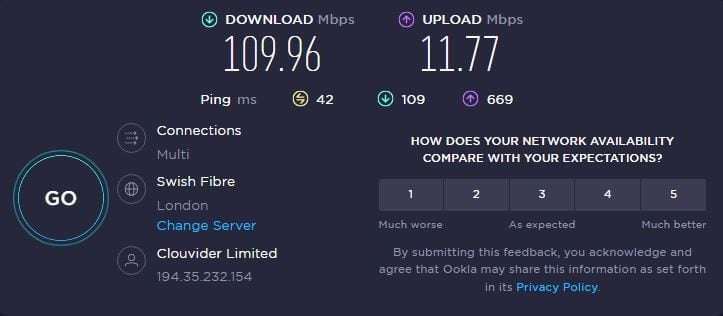
Japan:
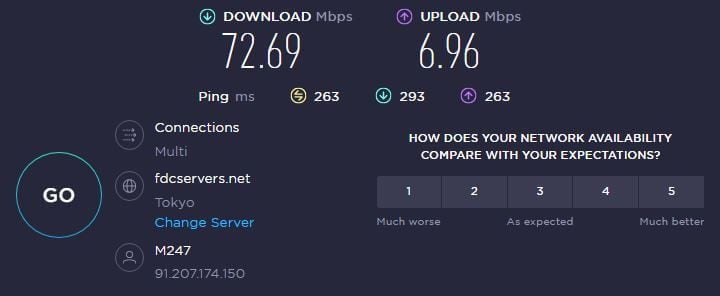
Australia:
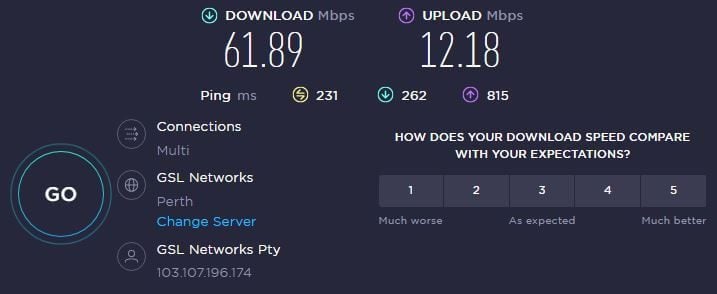
CyberGhost
US:
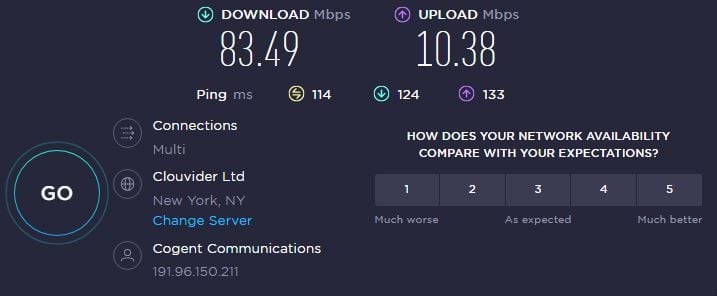
UK:
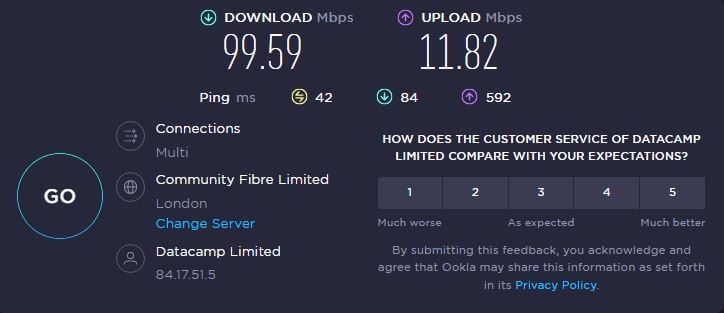
Japan:
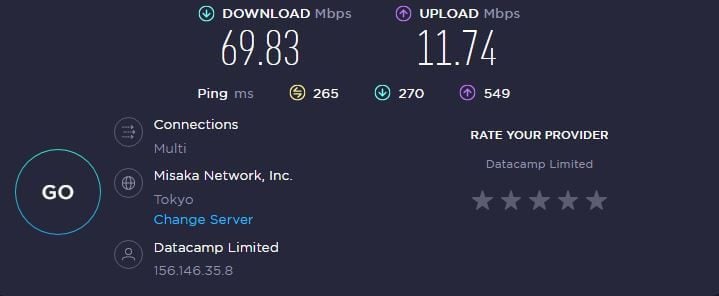
Australia:
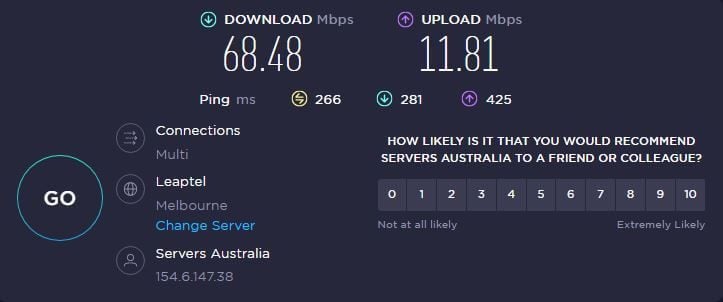
Who Wins?
On average, NordVPN is faster, while CyberGhost shows a bit better speeds only in Australia, but with higher ping. Therefore, NordVPN WINS this round of the CyberGhost vs NordVPN comparison.
Torrenting & P2P: Are CyberGhost and NordVPN P2P-Friendly?
Torrenting is frowned upon in many countries, which, many times, applies even to legal torrenting. To avoid any legal issues while using The Pirate Bay or Popcorn Time, you’ll need a highly secure VPN to encrypt your connection and keep the prying eyes away from your connection.
In addition, a great VPN for torrenting must provide fast enough speeds to minimize the performance impact and give you the best possible performance. Both providers, as said, offer P2P servers that are made specifically for torrenting.
CyberGhost offers P2P servers in 70+ countries, which I found rather impressive. NordVPN, on the other hand, has P2P servers in around 50 countries – also not a bad result. Performance-wise, despite being slower on average – but not much – CyberGhost went head-to-head with NordVPN.
Needless to say, both providers will give you an exceptional torrenting experience while keeping you safe and secure due to their encryption and no-logs policies. Of course, I tried and tested both providers by downloading a copyright-free torrent from 1337x.to and you can see that I had no issues.
Take a look at the screenshots below:
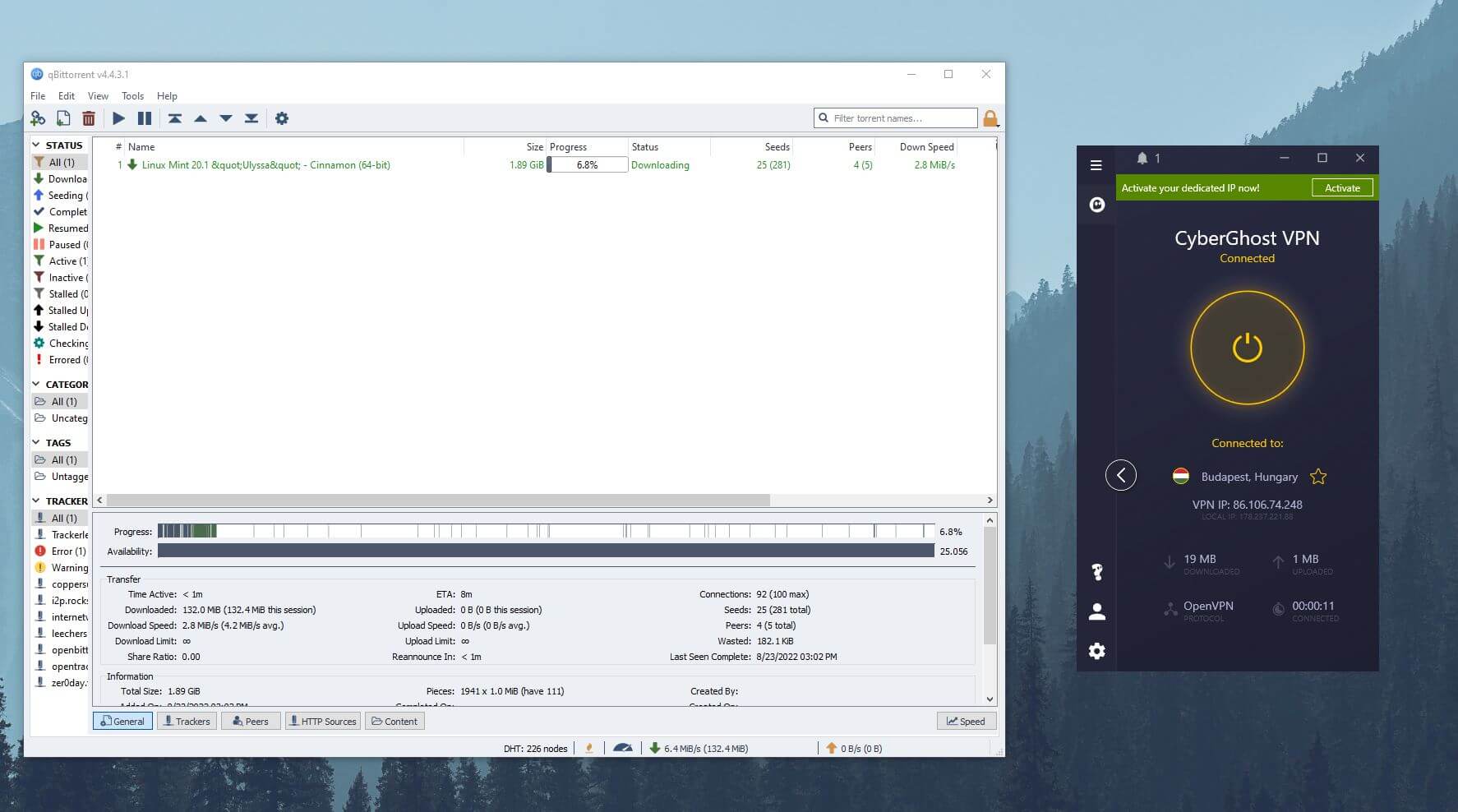
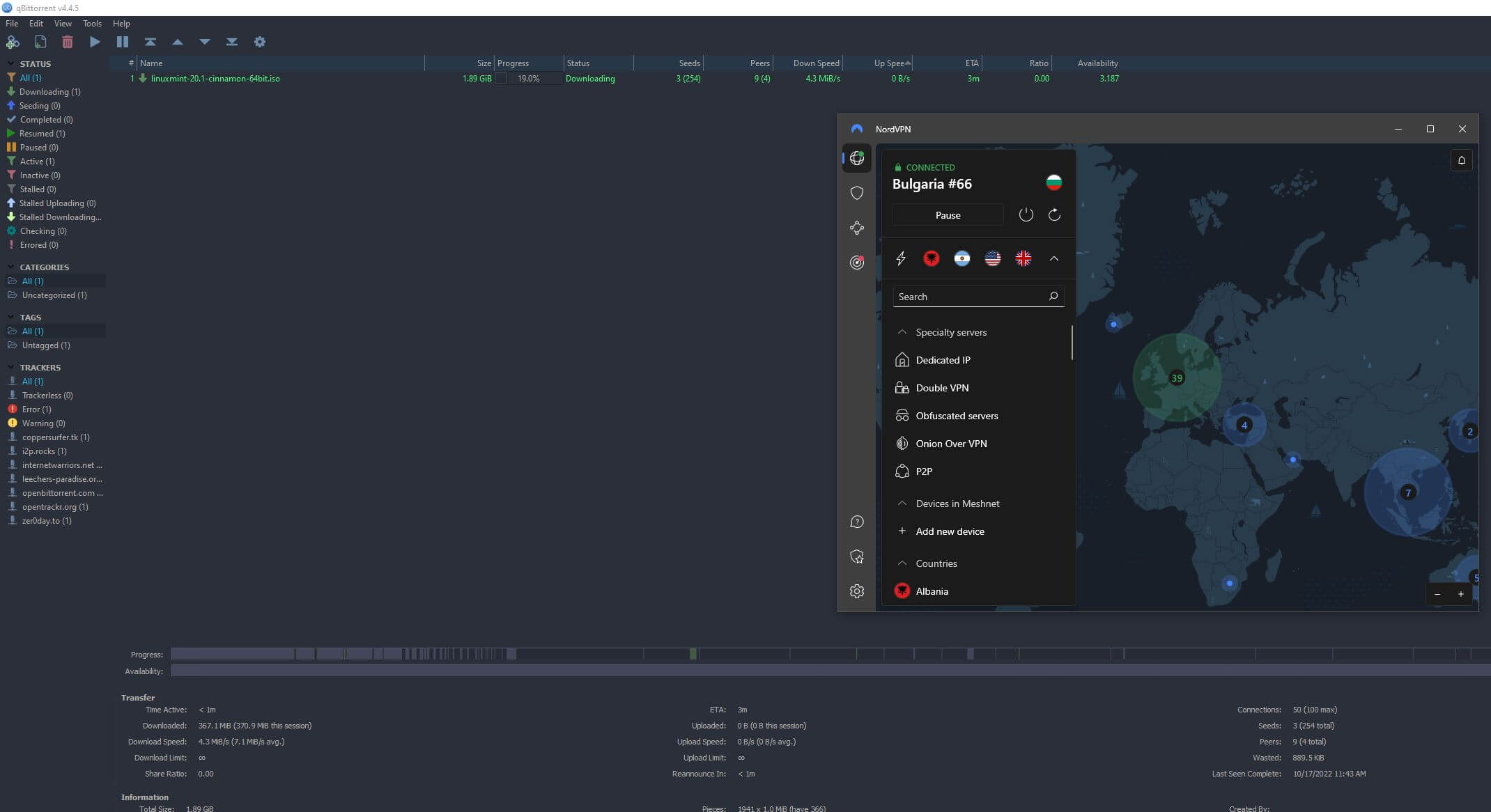
Who Wins?
In this round, CyberGhost WINS as it has P2P servers in 70 locations as opposed to 50 P2P server locations for NordVPN. Being as fast as NordVPN in this case, it’s easy to see why it wins this round.
Are CyberGhost and NordVPN Working in China?
This part of the CyberGhost vs NordVPN battle is a bit tricky for CyberGhost. For years, CyberGhost built its reputation on a big server fleet that often included heavily censored countries that were – and still are – populated with virtual servers for preserving security.
One thing where CyberGhost failed to impress its user base is bypassing censorship. To be honest, this provider has had problems in China for years at this point, and with no obfuscation technology in place, it’s impossible to use it in China.
We tested it by using our acquaintances in this country from time to time, and even today, we had no luck making it work on Chinese soil. But what about NordVPN? Well, NordVPN has a trick on its sleeve in the form of obfuscated servers.
They take advantage of OpenVPN TCP and allow you to bypass DPI (deep-packet inspection) which tends to cripple many VPNs in China, the UAE, or other censored countries. It’ll make your VPN traffic look like ordinary traffic, allowing you to use it without problems in China.
During our tests, NordVPN displayed amazing results in the country, working at least 9/10 times with no issues. Obfuscated servers, although great for this purpose, will slow your speeds a bit but that decrease is minimal and you won’t feel it in practice that much.
The important thing is that NordVPN works in China and CyberGhost doesn’t. I hope the Romanian provider will improve upon bypassing censorship one day, as it would make it an absolute beast given how cheap it is – more about that later.
Who Wins?
Needless to say, NordVPN WINS this round easily with its ability to work in China and other censored countries. It’s also a great choice if you’re looking to access sites blocked by your school. CyberGhost, unfortunately, cannot compete.
CyberGhost vs NordVPN Server Fleets: Which One Is Bigger?
Having a huge server fleet gives you many benefits. For one, you’ll be more likely to find less crowded servers, and second, you’ll be able to bypass geo-restrictions easier. In this part of the comparison, we have a clear winner, but let’s examine both VPN’s server networks either way.
CyberGhost (9,500+ servers in 100 countries)
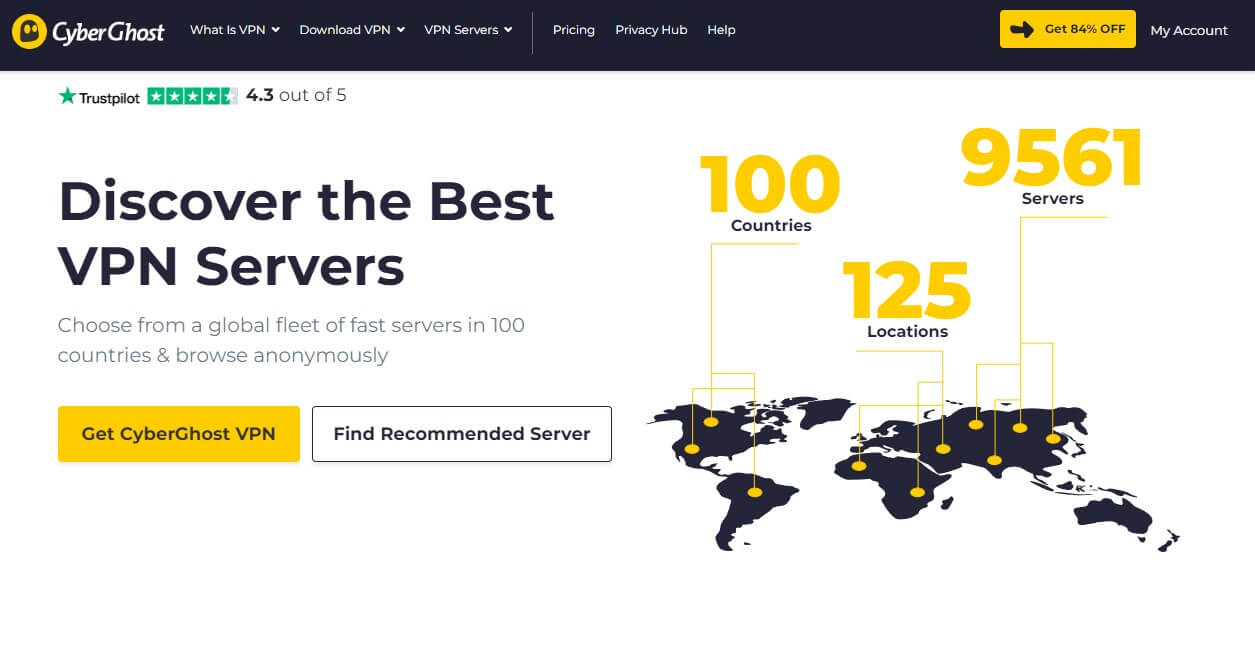
Starting off with CyberGhost, this provider packs 9,000 servers in 91 countries, and this number will increase as time goes on. Additionally, the servers are scattered around 115 locations, with the provider giving you dedicated P2P, streaming, and NoSpy servers.
The server fleet is excellent and I think I don’t need to speak much about that. When you cover 91 countries, which is almost half of the globe, your server coverage is going to be top-notch. This provider offers the most servers in Europe, which is pretty typical.
However, we can find many servers in American countries, even in those less popular, like Venezuela, Costa Rica, and even Greenland. Asian coverage is great too, as CyberGhost has lots of servers in Japan, Indonesia, and Hong Kong.
Surprisingly, it has virtual servers in India and even 12 virtual servers in China! Finally, its African coverage is among the best out there, as it has servers in the UAE, Israel (it is one of the best VPNs you can get for Israel), Morocco, Nigeria, and many other countries.
Overall, CyberGhost has one of the most extensive server networks that’s very hard to beat.
NordVPN (5,500+ servers in 60+ countries)
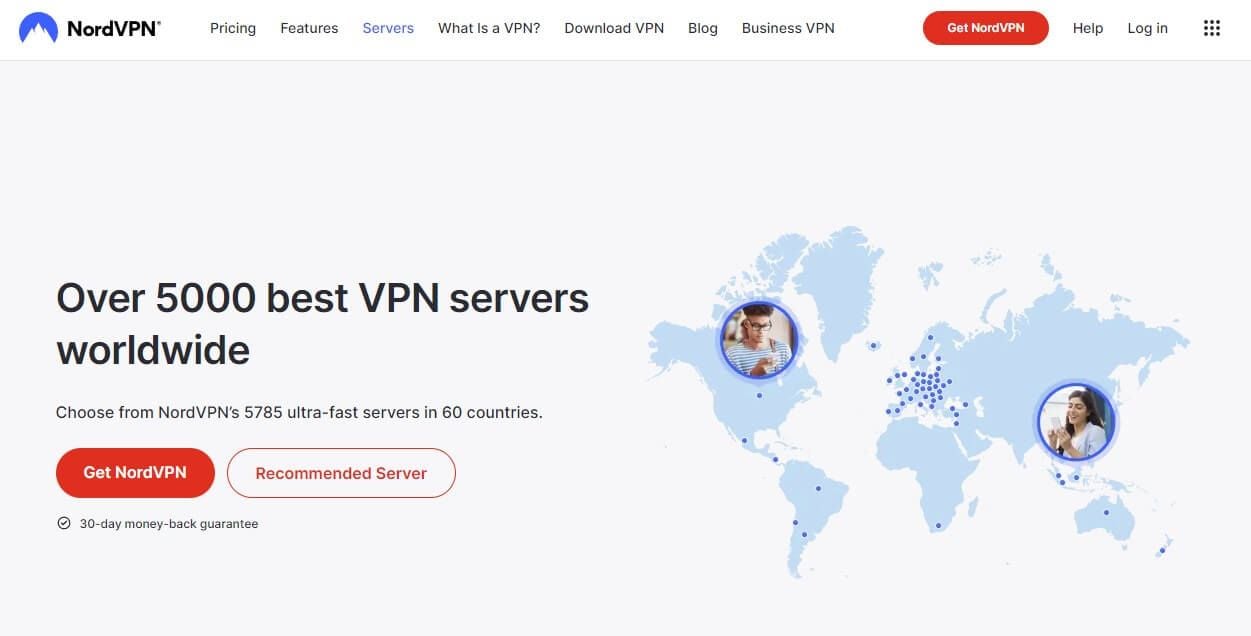
That especially applies to NordVPN with its 5,500 servers in 60+ countries. NordVPN’s server network isn’t small but compared to CyberGhost, it does look pretty small. Covering just 60 or so countries, this provider won’t grant you the best server coverage in comparison.
It focuses mainly on “popular” countries like the US, the UK, Canada, and many European countries. For instance, it has nearly 2,000 servers in the US alone, which is almost 40% or so of its entire server network – don’t mind my math, it’s not the best.
The coverage in American countries is far from satisfactory, as the provider gives you servers in just 7 countries, as opposed to 12 in CyberGhost. By far the worst results are in Africa where you get just 4 countries – the UAE, South Africa, Turkey, and Israel.
The good thing is that its Japanese, Australian, and Singaporean coverage is somewhat decent, and servers located in these countries are blazing fast. Additionally, NordVPN has specialty servers, too, offering P2P, Double VPN, obfuscated, and onion over VPN servers to access the dark web.
Who Wins?
This part of the comparison is straightforward. CyberGhost WINS due to having more servers, more locations, and better server coverage.
Customer Support of CyberGhost and NordVPN: How to Contact Them?
Customer support of CyberGhost and NordVPN is more than good. Both providers are renowned for their 24/7 live chat support that is fast to respond and very helpful. Needless to say, you’ll get a response in less than 15 seconds on average, which is pretty fast even for live chat support.
To complement this, both providers included email support for more complex issues, all while boasting how-to guides and FAQ sections full of helpful stuff. Even better – both VPNs offer YouTube channels! Unfortunately, CyberGhost isn’t very active and rarely publishes videos.
NordVPN, on the other hand, publishes very often and has many more subscribers than its rival. The silver lining for CyberGhost is its multi-language support that the other provider doesn’t have. Yes, it offers support in English, German, and French, which is great if you aren’t an English speaker.
Although German and French support isn’t here 24/7, it’s still great for the aforementioned users. Granted, neither of the providers offers ideal customer support compared to ExpressVPN, for instance. However, saying it’s bad would be a lie.
Besides, I’ve been using both providers for almost a decade and I never had a single issue with any of them.
Who Wins?
So who wins this round of the CyberGhost vs NordVPN comparison? I’d say this round is a DRAW considering that both VPNs are great at providing top-grade, reliable customer support through live chat and email.
Pricing Comparison: How Cheap NordVPN and CyberGhost Are?
The last battle in my NordVPN vs CyberGhost face-off will be one in terms of pricing. After all, if you’re on a limited budget, this is going to be a very important criterion.
NordVPN
So let’s start with NordVPN this time. It offers three plans to choose from, at least at first. However, we can see that the provider has 2-year, 1-year, and monthly plans. Since you get 3 plans for each duration, it means NordVPN’s pricing structure is comprised of 9 options.
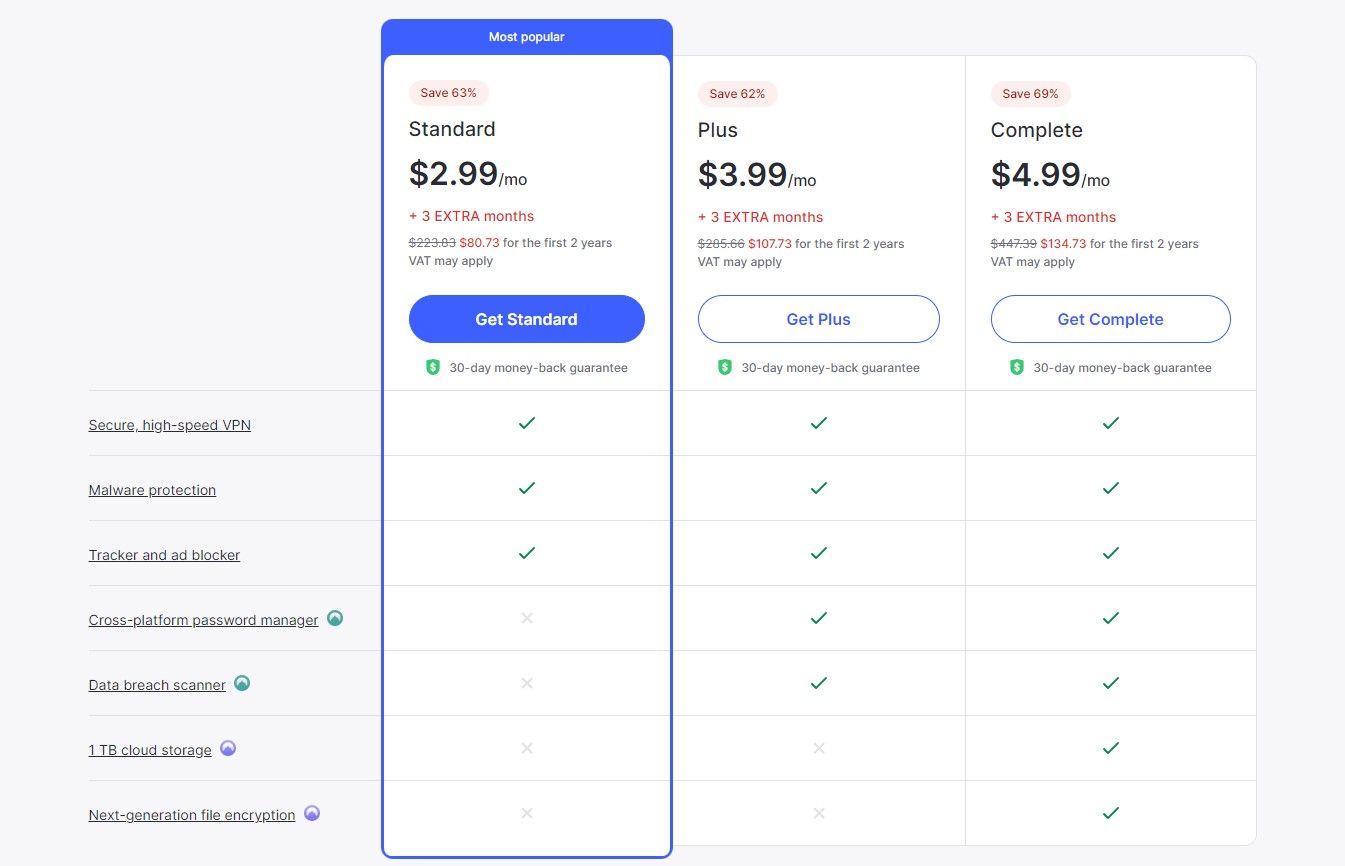
The Standard plan is the cheapest deal at under $3 a month. For a VPN of this caliber, this price is more than justified. Plus and Complete plans offer more features that aren’t VPN-related. In the Plus plan, you’re getting NordPass, Nord Security’s cutting-edge password manager.
For us, the best plan is the latest – Complete – but it’s also more costly at under $5 a month. Granted, this isn’t a very expensive price but still a stark difference compared to the Standard deal. We invite you to check our NordLocker review, as this excellent cloud storage service is included in the Complete plan.
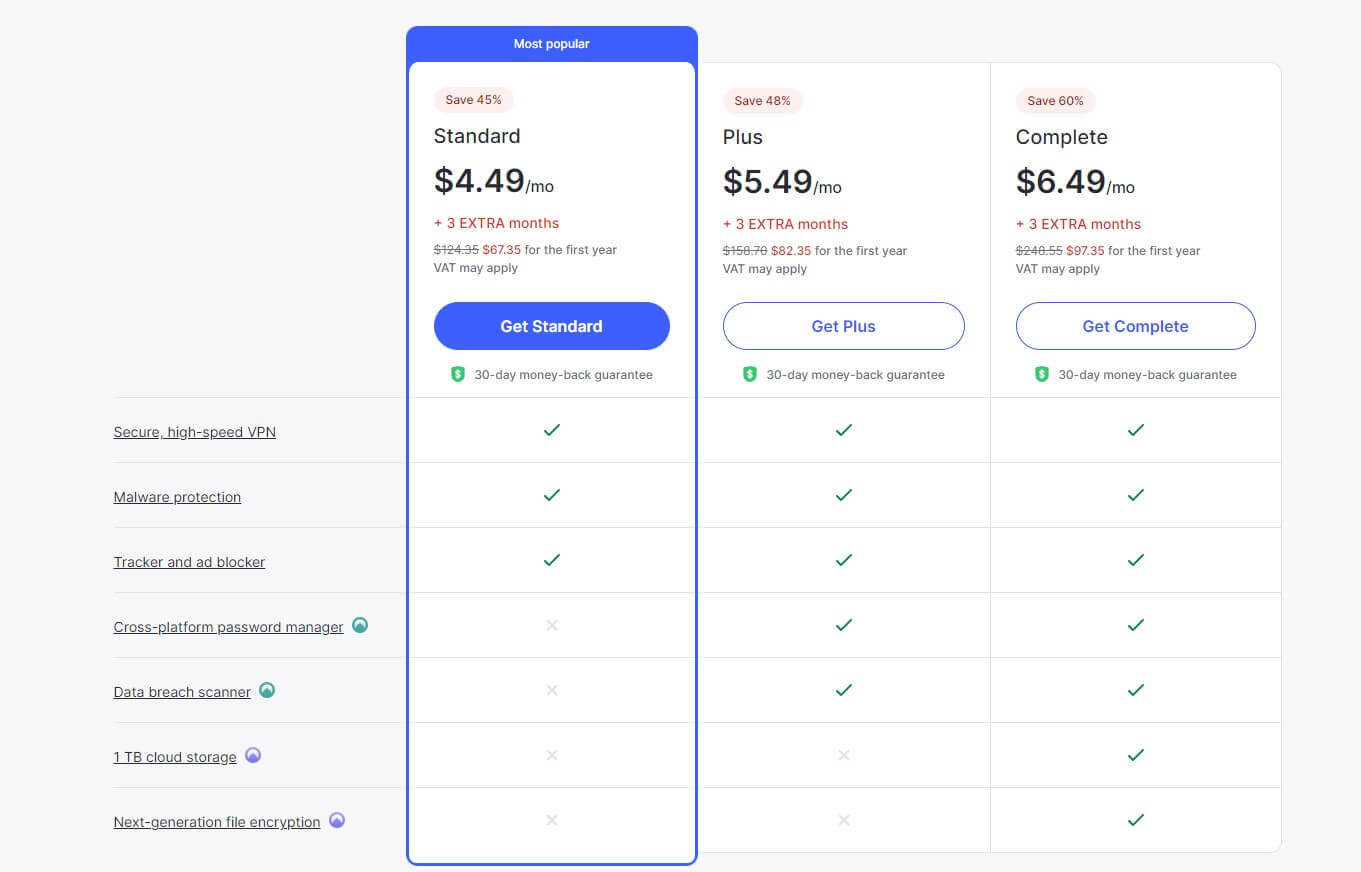
The annual plans of NordVPN are quite a bit expensive compared to the 2-year variants. The cheapest plan now starts at under $4.5 a month, while the complete plan is under $6.5. Compared to ExpressVPN, it’s still more affordable and you get NordPass and NordLocker.
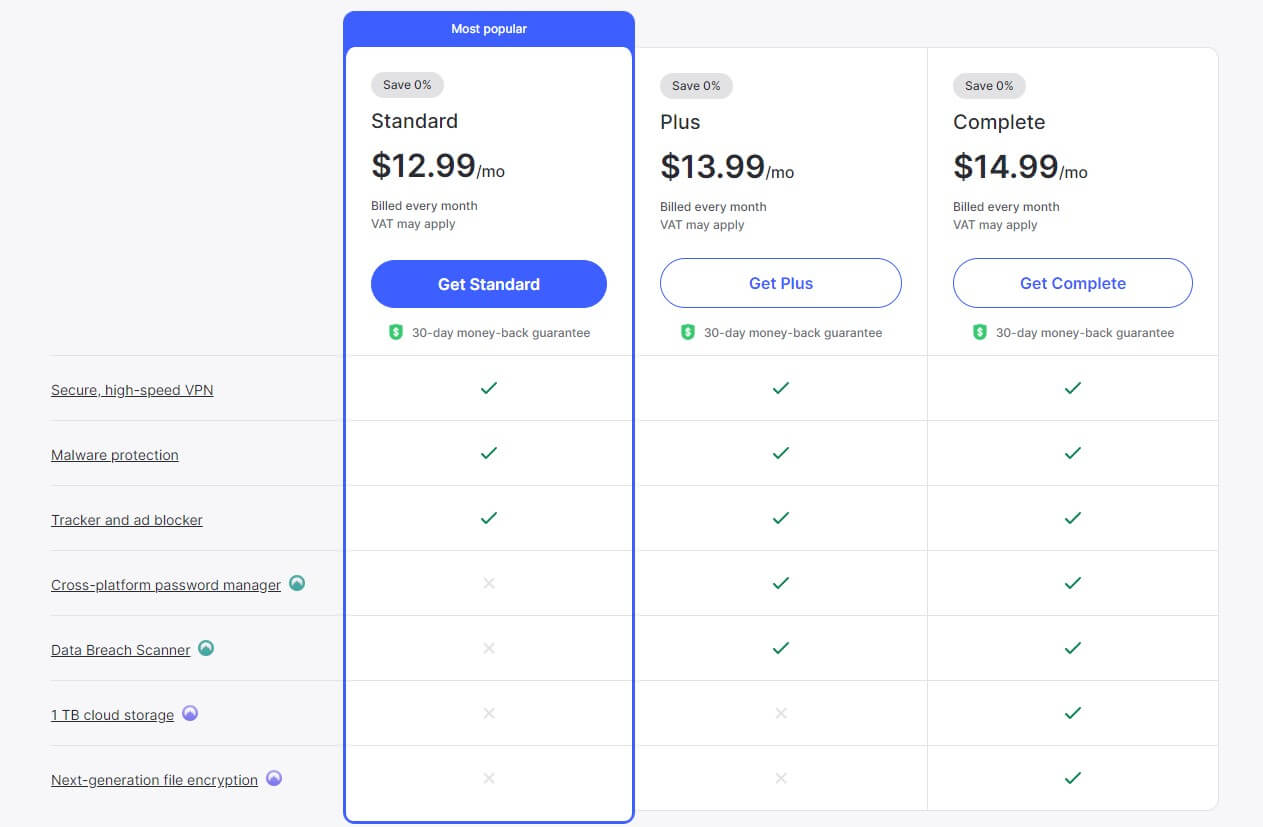
Our least favorite option is the monthly plan of NordVPN. While not as expensive as Surfshark, you can see that its prices are way over the top. The Standard plan at around $13 isn’t too alarming but the Complete plan at $15 a month sounds a bit ridiculous.
CyberGhost
CyberGhost offers a more straightforward pricing structure with no complications. As you can see, we’re talking about 3 plans ranging in length. Actually, its monthly plan is expensive, with the 6-month plan being a bit more wallet-friendly at around $7 a month.
Of course, the plan in the middle allows you to save the most money. It’s a remarkable 2-year deal with 3 free months at over $2.1 a month. This already sounds a bit better than NordVPN, even though this VPN is far from being expensive. Still, CyberGhost is the champ of affordability, so it’s hard to beat.
And do you know what? We’ve got an article covering CyberGhost coupons that can potentially reduce the price even further.

In terms of bonus features, you get some in both. Dedicated IPs can be bought separately but CyberGhost’s offer at $2.5 a month is, again, cheaper. The provider also offers the aforementioned security suite for Windows at $1 a month on top of the subscription.
At the time of writing this CyberGhost vs NordVPN duel, the first provider also offers 500 GB of free cloud storage on pCloud (yearly plan) plus Privacy Guard to disable intrusive functions of your OS and ensure you’re using it privately.
Who Wins?
Without a shadow of a doubt, CyberGhost WINS this round on pricing. It’s cheaper, offers a 45-day money-back guarantee, and supports PayPal. Its 2-year plan is extremely affordable, making this provider the best cheap VPN you can get.
Conclusion: CyberGhost Wins!
To conclude this CyberGhost vs NordVPN comparison for 2025, let’s do the math. Judging by the score of 6:5 for CyberGhost, the provider wins by a tiny margin. It’s better in terms of app/device compatibility, server fleet, torrenting, and pricing (it’s much cheaper).
NordVPN, on the other hand, offers slightly faster speeds and is a better provider for streaming overall. Additionally, NordVPN is better for bypassing censorship in China and some other countries, but even with this in mind, it wasn’t enough to beat its rival, losing only by one round.
It’s safe to say that we’re talking about two powerful providers with small differences here and there. I recommend using the one you like more based on this comparison. If you care about the price in the first place, CyberGhost is probably going to be your choice.
However, if you find faster speeds and better streaming capabilities more important and you don’t mind paying a bit more, NordVPN is surely a better pick. Make sure you use our site to get the cheapest deals on some of the best VPNs you can currently get – including these two!